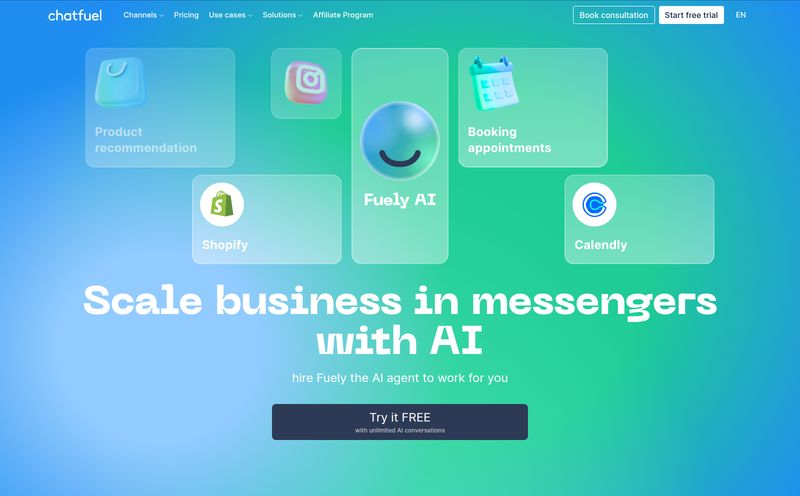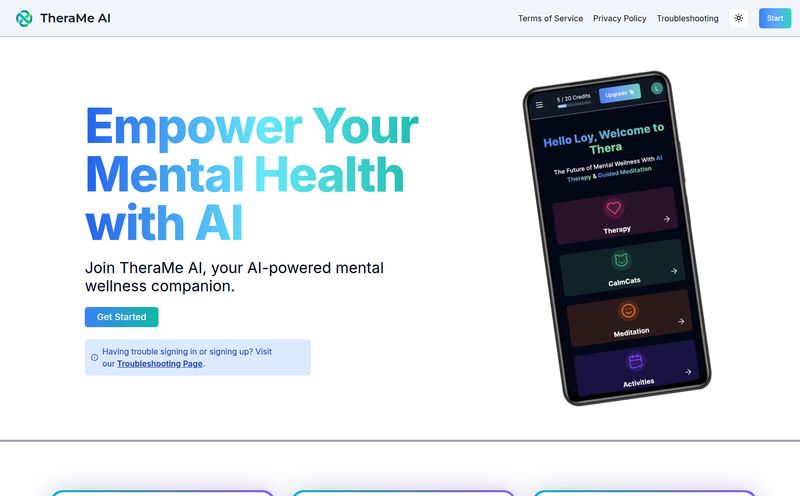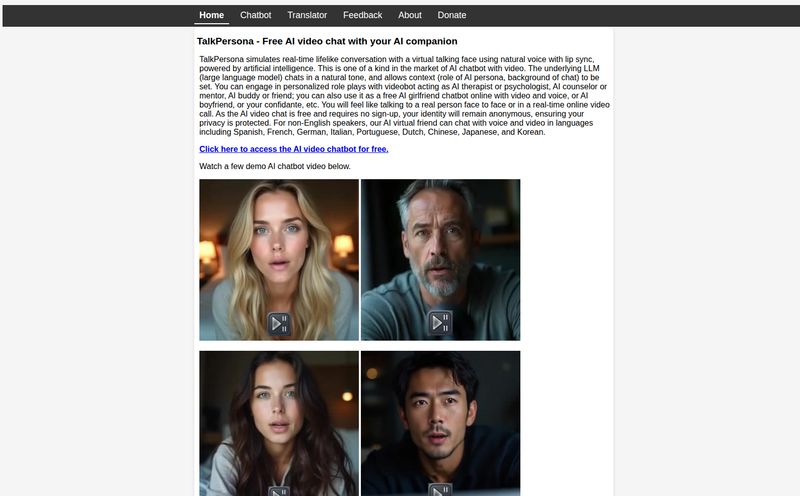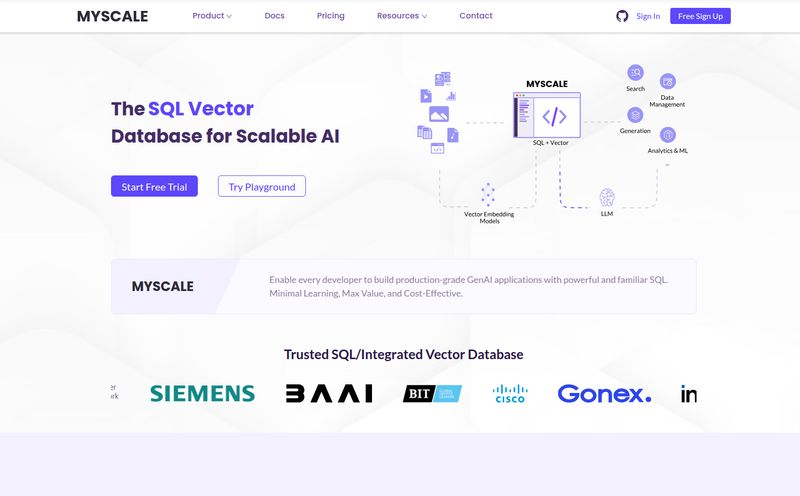It’s 2 AM. The house is quiet, the city is asleep, but your brain is running a marathon. You know the feeling. That weird anxiety that creeps in when there's no one to talk to, and your thoughts just start… spiraling. We’ve all been there. For years, the only options were to either journal it out, wake up a very patient friend, or just wait for the sun to rise. But the tech world, in its relentless march forward, has offered up a new solution: the AI therapist.
I've been watching this space for a while now, seeing how AI is weaving itself into every corner of our lives, from optimizing ad spend to, well, this. And one name that popped onto my radar was Wendy. The promise is simple and powerful: mental health support, 24/7, right from your phone. But as with any new tech, especially one touching something so deeply human as mental health, I'm always a little skeptical. A little curious.
So, I went to check out their website... and was greeted with a “Not Found” page. Ironic, isn't it? An AI designed for support that’s currently unavailable. It’s a perfect, if accidental, metaphor. Even the most advanced systems can have an off day, just like us. But a 404 error doesn't stop us, it just makes the story more interesting. Let's talk about what Wendy is supposed to be.
What Exactly is Wendy AI and Who Is It For?
At its core, Wendy isn’t trying to be a digital Sigmund Freud. It's an AI-powered coach. Think of it less as a therapist diagnosing complex conditions and more as a 'mental fitness' partner. It’s there to be a sounding board, a place to brainstorm solutions to daily challenges, and a private space to vent without feeling like you're bothering someone.
The platform is designed for two main groups: individuals who want on-demand support for life's general ups-and-downs, and companies that want to offer a scalable mental wellness benefit to their employees. For a business, the idea of improving performance and retention through mental health support is a no-brainer in today's market. For an individual, it's about having an immediate, accessible outlet.
The Promise of Always-On Mental Wellness
The appeal of a tool like Wendy really boils down to a few core promises that traditional therapy, for all its strengths, struggles to meet.
A Therapist That Never Sleeps
This is the big one. The 24/7 availability. I’ve had moments of panic late at night where my next therapy appointment felt a lifetime away. The ability to just open an app and start typing, to get some kind of interactive feedback, is genuinely appealing. It bridges the gap between those weekly or bi-weekly sessions, acting as a pressure release valve when you need it most. No scheduling, no waiting rooms, just instant access.
Your Secrets are Safe, Right?
Wendy touts itself as a confidential & judgment-free environment. This is huge. The stigma around mental health is real, and for many, the fear of being judged is a massive barrier to opening up. Talking to an AI, by its very nature, removes that social friction. You can say the 'wrong' thing or admit to a feeling you're ashamed of without worrying about the look on someone's face. It's a sterile, safe container for your messiest thoughts.

Visit Wendy AI
Personalized Support or Just a Fancy Chatbot?
Here’s where things get interesting. Wendy claims to offer personalized support and measurable results. This moves beyond a simple chatbot that gives canned responses. The idea is that the AI learns from your conversations, identifies patterns, and offers tailored exercises or insights. It's meant to be an interactive training partner. The 'measurable results' part is also key for us data-driven folks; seeing progress can be incredibly motivating.
Let's Talk Money: The Cost of AI Therapy
Okay, let's get down to brass tacks. Traditional therapy is expensive. Depending on where you live and your insurance, a single session can run anywhere from $100 to $250+. It's a serious financial commitment. Wendy, on the other hand, comes in at a fraction of that cost.
| Plan | Price | Features |
|---|---|---|
| Wendy Pro | $15 / month | Universal phone access, private and judgement-free, 24/7 availability. |
Fifteen dollars a month. That’s like, three fancy coffees. This price point makes mental health support radically more accessible. It's not an either/or with traditional therapy; it's a completely different category of tool that millions more people can actually afford.
The Unspoken Caveats of a Digital Confidant
As exciting as this all sounds, we need to be realistic. An AI therapist is not a panacea. It comes with some serious limitations that you absolutely have to consider.
When AI Isn't Enough
Let's be crystal clear: Wendy is not suitable for severe mental health conditions. If you are in crisis, dealing with trauma, or have a serious diagnosis like bipolar disorder or schizophrenia, you need human, professional care. An AI cannot manage risk, it can't respond to a crisis with the nuance required, and it's not a substitute for clinical intervention. It's a tool for wellness, not a treatment for illness. If you are in distress, please reach out to a professional or a hotline like the National Suicide Prevention Lifeline.
The Human Element (or Lack Thereof)
The biggest counterpoint, and it's a valid one, is the lack of genuine human connection. So much of what makes therapy effective is what psychologists call the "therapeutic relationship." It's the trust, empathy, and rapport you build with another human being. An AI can simulate empathy, but it can't feel it. It can't catch the subtle hesitation in your voice or read your body language. For some issues, that human connection is non-negotiable.
It Only Works If You Do
Finally, the effectiveness of a tool like Wendy is completely dependent on your engagement. There's no appointment holding you accountable. You have to be self-motivated to open the app, to be honest in your inputs, and to actually try the exercises it suggests. It's a self-directed process, which can be a pro for some and a major con for others.
My Take: Is Wendy a Friend or Just Code?
So, what’s my final verdict? After years in the SEO and tech trend space, I've seen a lot of apps that promise to change the world. Most dont. But I think the way to look at Wendy isn't as a replacement for therapy, but as a new category of tool: a gym for your mind.
You don't go to the gym to perform open-heart surgery on yourself; you go to build strength, resilience, and maintain your health. That's what Wendy feels like. It’s for the daily maintenance. It’s for the person with social anxiety who finds the idea of a face-to-face meeting terrifying. It’s for the student pulling an all-nighter who just needs to unload some stress. It’s a fantastic first step.
And yes, the website being down is a bit of a fumble. But it's also a humbling reminder that nothing is perfect. The idea behind Wendy is sound, and I genuinely hope they get their servers sorted out, because in a world where we're all trying to be a little healthier, our minds deserve a spot on the priority list too.
Frequently Asked Questions about Wendy AI
- Is Wendy a real, licensed therapist?
- No, and this is an important distinction. Wendy is an AI-powered mental wellness tool, not a licensed medical professional. It's designed for coaching and support, not for the diagnosis or treatment of clinical mental health conditions.
- How much does Wendy cost?
- The pricing information available points to a 'Wendy Pro' plan that costs $15 per month. This provides 24/7 access to the AI coach from your phone.
- Can Wendy replace my current human therapist?
- Absolutely not. It's best viewed as a supplement to traditional therapy or as a tool for managing everyday stress. If you have an existing relationship with a therapist, Wendy could be a great tool to use between sessions, but it cannot replace the expertise and human connection of a professional.
- Is talking to an AI like Wendy really private?
- Wendy is built on a foundation of being confidential and private. However, as with any digital service, it's always a good practice to read the company's privacy policy to understand exactly how your data is handled.
- What is the main benefit of using Wendy?
- The primary benefits are accessibility and affordability. It provides an immediate, 24/7, judgment-free outlet for your thoughts and feelings at a price point far below traditional therapy.
- Who should not use Wendy?
- Anyone experiencing a mental health crisis, having suicidal thoughts, or living with a severe mental health diagnosis should not rely on Wendy. In these cases, it is critical to seek immediate help from a qualified human professional or a crisis support service.
Final Thoughts
The conversation around mental health is changing, and technology is undeniably a part of that shift. Tools like Wendy represent a move towards democratizing mental wellness, making it more immediate and affordable. It's not a perfect solution, and it will never, ever replace the profound value of human connection. But as a first line of defense against daily stress, a private journal that talks back, or a fitness coach for your emotions? It's a pretty compelling idea. It’s a tool for the modern world, and I for one am excited to see how it—and the entire field of AI wellness—grows from here.
Reference and Sources
- Wendy Labs Official Website: https://www.wendylabs.com/ (Note: Website was experiencing issues at the time of writing).
- Psychology Today on the Therapeutic Relationship: https://www.psychologytoday.com/us/basics/therapeutic-relationship
- National Suicide Prevention Lifeline: Dial 988 in the US.



